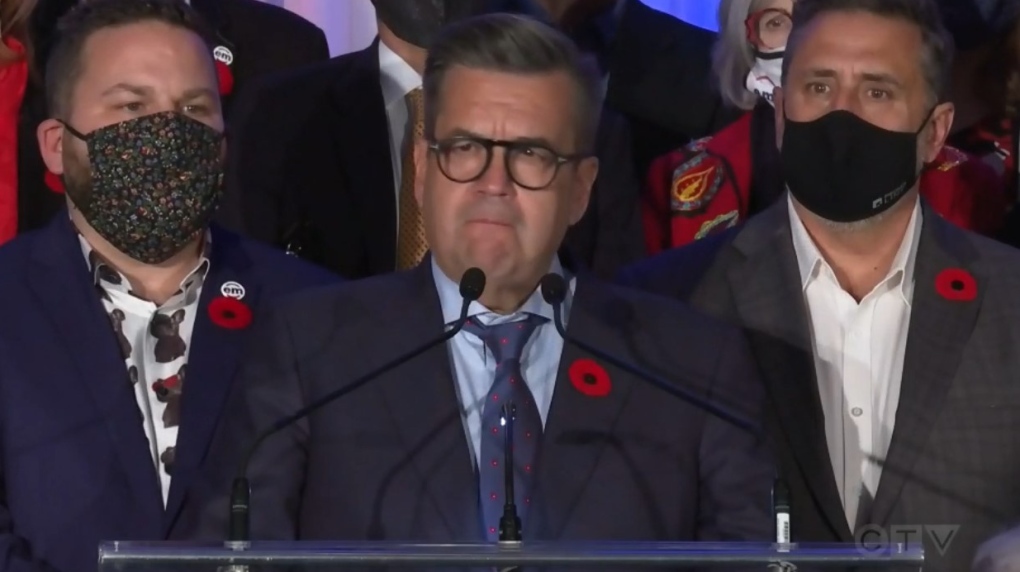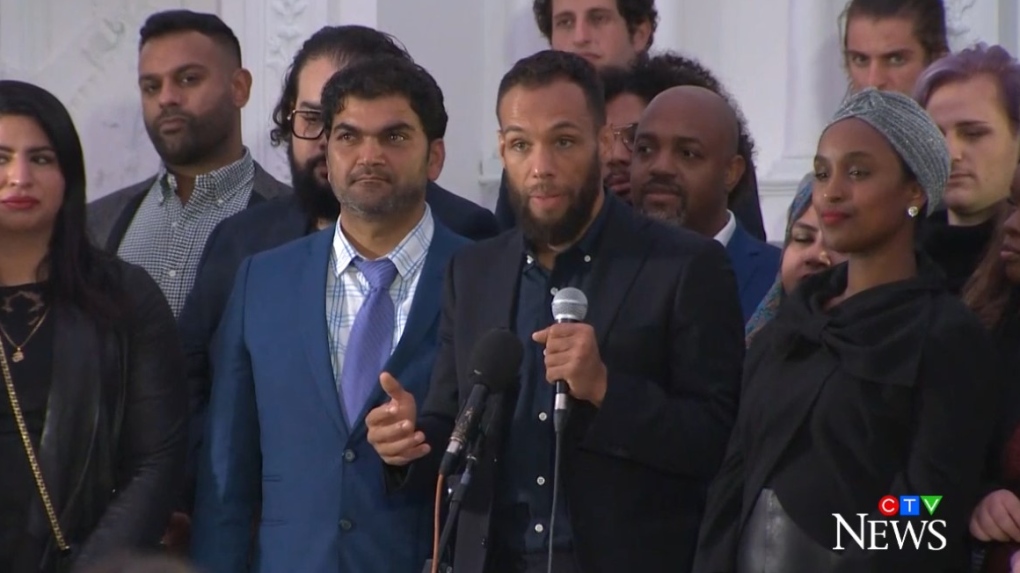Valerie Plante wins second term as Montreal mayor, cementing 'new era'
Valerie Plante has handily won a second term as Montreal's mayor, saying it's a sign Montrealers want a more permanent kind of change than anyone knew.
"What [voters] have confirmed tonight is that the election of Projet Montreal in 2017 wasn't just a fluke," Plante said in a victory speech shortly after 10 p.m.
"It was, in fact, the beginning of a new era, the beginning of governing Montreal in a different way... for the long term," she said, and with "transparent" leadership.
When the final results were in on Monday, Plante had won by about 14 percentage points and nearly 60,000 votes, earning 52 per cent of the vote compared to 38 per cent won by her challenger, former mayor Denis Coderre.
Plante declared her victory just after 9 p.m. Sunday. A crowd of supporters erupted in cheers at Theatre Olympia on Sainte-Catherine St., where the Plante campaign team was gathered to await results.
In an effusive speech, as the crowd continued to shout, Plante said voters also showed "that we can lead Montreal with a smile," punctuating her speech with loud whoops and laughter.
She also did a victory dance at the end of the speech.
Since 2017, Projet Montreal has also been "renewed, diversified," she said.
Montreal "is the envy of the world for its quality of life and its commitment to ecology," she said.
Her campaign revolved largely around climate change and long-term city planning linked to it, such as encouraging cycling, as well as affordable housing, including a plan to build more public housing and co-ops and to create strict new rules for landlords.
Plante spoke in French for the first 15 minutes or so of her speech, then switched to English for about a minute before switching back to French for a few more minutes.
"Montreal is a city of many diverse communities," including "groups that have their long-lasting institutions and traditions," she said during the short English portion.
"You can count on us to be there and to represent all of you."
Turnout in this election was very low at just 36.27 per cent, according to final numbers released Monday morning.
That's more than a five-point drop below 2017's turnout, though it's also true that about 30,000 fewer people were registered to vote this year, for unclear reasons -- the population has grown since 2017.
CODERRE ASKS VOTERS TO 'TRANSCEND PARTY POLITICS'

Up until the last week of the campaign, Coderre and Plante were tied in polls until two polls a few days ago showed Plante breaking away with about a six-point lead -- far less than the margin she ended up with.
It was Coderre's second loss to Plante. He gave a concession speech about 10:45, not long after Plante appeared.
The two didn't appear to have spoken at the time -- in her speech, Plante said she had tried to call Coderre but the line was busy, and that she was sure they would "speak later."
While said he wanted to send his congratulations to her, he also said this race was one of the dirtier ones he remembers.
But the longtime politician, who was a federal MP for years before turning to local politics, spent most of his time onstage taking a more pensive tone, talking about the health of local democracy and asking his supporters to be "part of the solution," despite this loss.
He said he was alarmed to see Sunday's extremely low voter turnout rate.
"I love Montreal," he said. But also, "Montreal needs love, Montreal needs help."
"I ask all people... we need to transcend party politics" and get involved in various ways, he said.
"It's worth the effort."
Speaking later in English, he said he believes English speakers are feeling alienated right now and need more "bridge-builders."
"I think the English community feels alone these days," he said. "We need to bring back people... instead of putting oil on fire."
As for his own political future, however, Coderre wouldn't say Sunday if he'll remain in municipal politics or in politics at all. After his 2017 loss, he quit as leader of the opposition and entered the private sector as a consultant.
He said to expect news Monday or Tuesday on whether he'll stay on as his party's leader.
Compared to Plante, Coderre ran on a platform geared more towards business and policing, saying Montreal is in the middle of a security crisis.
He promised, if elected, to remove some of the new bike lanes that have been built around Montreal in the last four years, catering more to local businesses who have worried about losing parking spots.
On housing, he planned to "flood the market" with new private units to solve spiralling prices.
In the last week, he was also dogged by demands for financial disclosures, and then the disclosures themselves, which showed he spent recent years working for a major real-estate company, among other consulting contracts.
In the end, Coderre proved more popular with voters in six out of Montreal's 19 boroughs, namely Anjou, Montreal-Nord, Pierrefonds-Roxboro, Rivière-des-Prairies–Pointe-aux-Trembles, Saint-Laurent, and Saint-Léonard.
'THIS IS JUST THE BEGINNING': HOLNESS
 Balarama Holness delivers concession speech
Balarama Holness delivers concession speech
In his own concession speech, former Montreal Alouette Balarama Holness promised that his party, the brand-new Mouvement Montreal, will continue despite its distant third-place finish with seven per cent.
"Mouvement Montreal is here to stay and we're just getting started," he said at around 9:45 p.m., before Plante spoke, in remarks beginning in English.
"For the critics and the naysayers, this is the end," he said, but for the "enthusiastic" supporters who came out for the party, "this is just the beginning."
He also congratulated Plante and said people clearly placed their trust in her, saying people now need to "come together" and that his colleagues will continue to push the new administration towards "the arc of justice."
Holness also said he hopes Montrealers will still get a chance, over time, to get to know those who ran for his party, since many of them are already "change-makers" in their neighbourhoods.
"People who are dedicated to social justice, dedicated to improving our environment, dedicated to building communities for all," he called them, saying the party wasn't about him, one person, running for office, but about advancing a new political vision.
CLIMATE, HOUSING AMONG PRIORITIES: PLANTE
In her speech, Plante also spoke at some length about what she heard on the campaign trail and what her party envisions for its new mandate.
"It was four years ago that Montreal elected its first woman," she added, and now, it will be "led by two women," beginning a chant for Dominique Ollivier, who has been named the new director of the executive committee.
Her first term took a turn no one could have predicted when the pandemic hit, she said, but over the next four years she wants to refocus and build on a few key goals, particularly making the city more low-carbon as fast as possible.
She also spoke about the importance of ensuring Montreal remains a realistic and affordable place to raise a family.
In English, she said certain issues are clearly top of mind for all Montrealers, no matter the region.
"During this campaign, I had the opportunity to to meet Montreal leaders from all across the island, in every borough," she said.
"No matter where I was, the message was the same. We spoke about the issues which are important to all of us: housing, transportation, the environment, our security, but also our quality of life."
LISTEN ON CJAD 800 RADIO: What went wrong for Coderre? What went right for Plante? Why the low voter turnout? Tom Mulcair weighs in
CTVNews.ca Top Stories

Ho! Ho! HOLY that's cold! Montreal boogie boarder in Santa suit hits St. Lawrence waters
Montreal body surfer Carlos Hebert-Plante boogie boards all year round, and donned a Santa Claus suit to hit the water on Christmas Day in -14 degree Celsius weather.
Historical mysteries solved by science in 2024
This year, scientists were able to pull back the curtain on mysteries surrounding figures across history, both known and unknown, to reveal more about their unique stories.
Mother-daughter duo pursuing university dreams at the same time
For one University of Windsor student, what is typically a chance to gain independence from her parents has become a chance to spend more time with her biggest cheerleader — her mom.
Azerbaijani airliner crashes in Kazakhstan, killing 38 with 29 survivors, officials say
An Azerbaijani airliner with 67 people onboard crashed Wednesday near the Kazakhstani city of Aktau, killing 38 people and leaving 29 survivors, a Kazakh official said.
Montreal man dead after boat explodes in Fort Lauderdale
A Montreal man is dead and several others are injured after a boat exploded in Fort Lauderdale, Florida.
King Charles III focuses Christmas message on healthcare workers in year marked by royal illnesses
King Charles III used his annual Christmas message Wednesday to hail the selflessness of those who have cared for him and the Princess of Wales this year, after both were diagnosed with cancer.
Alberta premier hopes for health reform payoff in 2025, regrets deferring tax cut
"It may have been better for Albertans if we'd implemented and then found a way to be able to pay for it."
NFL's Netflix debut on Christmas Day kicked off without a glitch
Mariah Carey opened Wednesday’s doubleheader with a taped performance of “All I Want for Christmas is You” before Patrick Mahomes, Travis Kelce and the two-time defending Super Bowl champion Kansas City Chiefs faced off against Russell Wilson, T.J. Watt and the Pittsburgh Steelers.
Second storm incoming for Christmas Day in southern B.C.
Environment Canada has issued a new series of weather warnings for British Columbia’s south coast Christmas morning.

































